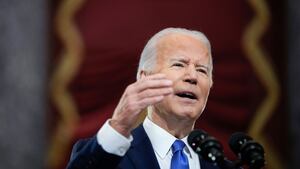Rep. Jared Huffman (D-CA) and Rep. Paul Gosar (R-AZ) are political polar opposites, but in one of those “only happens in Washington” situations, the two men formed a friendly bond after serving for nearly a decade together, working on policy and in committee.
“We’ve found some bills to get to do together. Got along pretty well,” Huffman told The Daily Beast. “You know, we’re respectful of each other."
Adding that sort of camaraderie between members “adds a lot” to the job.
But as time went on, Gosar went into an “irreversible downward spiral,” Huffman said. And that’s made the California congressman reevaluate their relationship.
On Jan. 6, 2021, Gosar was one of 147 Republicans to vote against certifying the 2020 election results, citing unsubstantiated claims of voter fraud. In the months since, he’s been censured and removed from his committee assignments for sharing an anime video of him killing Rep. Alexandria Ocasio-Cortez (D-NY).
Now, Huffman wants nothing to do with him.
“He’s totally toxic, and honestly, he’s just not someone that I or any of my other colleagues even can have a conversation with,” Huffman said.
Huffman and Gosar’s collegial relationship is one of many bipartisan bonds to crumble over the past year. Once-genuine friendships have devolved into acknowledgment nods in hallways. Cordial relationships have fallen into outright disdain and distrust. And the two parties appear—both legislatively and personally—further apart than ever. The events of Jan. 6 and the noxious environment in Congress that followed are making repair unthinkable to many members.
“We’re losing that space in which we’re actually able to talk to each other… This is not the kind of environment that is conducive to the kind of debate over important issues that we should be having,” Rep. Andy Kim (D-NJ) said.
But it’s not just friendships. Congressional delegations, groups of members from the same state that tend to band together when natural disasters strike or on issues that directly impact their region, have also become strained.
Rep. Jason Crow (D-CO) has seen this dynamic play out in his own delegation, due to freshman Rep. Lauren Boebert’s (R-CO) full-throated embrace of all things “Stop the Steal” and other Trump-manufactured fictions.
Boebert isn’t just another Trump-endorsed member who voted against certifying results; she’s been at the forefront of GOP efforts to cast doubt on the 2020 election and vilify Democrats. In December, she drew fire from Democrats for making an Islamophobic “joke” about Rep. Ilhan Omar (D-MN), which Republican leadership refused to condemn.
“Her rhetoric poses very direct dangers to people that I represent… So, that has been challenging for sure,” Crow said.
Sen. Bob Casey (D-PA) told The Daily Beast Jan. 6 also strained connections with his conservative colleagues. “It’s definitely changed my relationships with members of my congressional delegation.”
“We had eight out of nine Republican members from Pennsylvania vote against Pennsylvania on January 6. That is inexcusable. It’s enraging,” Casey added.
In other parts of the Capitol, relationships that were uncomfortable to begin with have become openly hostile.
Rep. Cori Bush (D-MO) in January 2021 moved her office away from Rep. Marjorie Taylor Greene’s after Greene allegedly berated the Missouri congresswoman in a hallway. It’s not just Bush Greene has alienated. The Georgia freshman also posted an anti-transgender sign outside her office to antagonize Rep. Marie Newman (D-IL), the mother of a transgender daughter who had put up a pro-trans flag.
There is other physical evidence of the frayed relations, but few are more ominous than the magnetometers outside the House chamber, installed due to Democratic fears that their Republican colleagues would bring weapons on the House floor.
As Congress gathered to mark the anniversary of Jan. 6, hugs and heaps of supportive words between members replaced any hostility—but only one sitting Republican member showed up.
Rep. Liz Cheney (WY) and her father, former Vice President Dick Cheney, stood alone on the Republican side of the aisle during the moment of silence for victims of the insurrection one year ago.
But members insisted there are some pockets of comity.
Some members noted moments of reprieve throughout 2021, like the bipartisan infrastructure working group—a group of 10 members of all partisan stripes—which Sen. Jon Tester (D-MT) said allowed members to develop “some very good relationships.” Crow said he’s grown closer to Republicans who put country over party. “Fundamentally, we come from a very similar place,” he said.
Rep. Cheri Bustos (D-IL) said the congressional softball game in 2021 was a politics-free space where folks managed to put differences aside.
“You show up on an elementary school lot and play softball at seven o’clock in the morning and you’re in your rawest form. You’re in your sweatsuit, you’re not wearing any makeup, you’ve barely combed your hair…” Bustos said. “I know while I have teammates who did not vote to certify the electoral returns of the November 2020 election, we just don’t talk about it.”
Huffman said the congressional baseball game this year offered a similar effect, with folks bantering and having a good time. President Joe Biden attended, visiting both teams. But even there, divisiveness seeped in.
During the event, Republicans invited retired major league baseball player Darrell Evans into their dugout, two Democratic sources confirmed to The Daily Beast.
After the game, Democratic Reps. Andy Levin and Dan Kildee, both Michiganders, tried to chat with Evans, a two-time All-Star and World Series champion who spent much of his career with the Detroit Tigers, but were instead met with profanity-laden remarks and ire about Democrats.
“I thought that was a real telling example, you know, not just the fact that there are people out there that carry this kind of hate. We know that,” said Huffman, who played in the game. “But then our Republican colleagues would bring them into a congressional baseball game and turn them loose. That’s not OK.”
For freshman members, this post-insurrection Congress is all they’ve ever known.
Rep. Sara Jacobs (D-CA), a first-term lawmaker, told The Daily Beast her freshman class is one of the only classes to do new-member orientation in a bipartisan way. And because of COVID, the freshmen mostly only knew each other toward the beginning of their tenures, she said.
Jacobs says that experience allowed her to build relationships across the aisle, which have served her in legislating and committee. But the congresswoman said it was “certainly difficult” to watch some Republicans she’d gotten to know side with election deniers on Jan. 6.
“I was very disappointed when we all came back after the attack and they still voted against certification of the election. That was really hard and it certainly affected everything moving forward,” she said.
Bustos hopes the incoming freshman class of Congress—those elected in 2022—will have a fresh start next year. They won’t have such direct experiences with the events of Jan. 6. “I hope they bring in new energy… and kind of a fresh start to how Congress can hopefully look in the future,” she said.
Huffman isn’t so sure a freshman class will help.
“Every new class is an opportunity for that. The unfortunate reality though, is that Trump’s grip on the Republican Party and the Republican primary process is so firm that we are just getting more extreme members with each new class,” he said.
Huffman continued, “So, if that pattern holds, and I see no reason to think it won’t, the next class of Republicans will be even Trumpier.”








